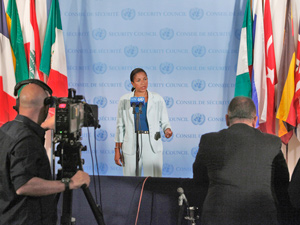
(FinalCall.com) – Sudan’s upcoming January 2011 referendum that will decide whether Southern Sudan secedes and forms a separate nation state seems plagued with the same confusion of tongues bestowed upon the Babylonians in the book of Genesis.
The referendum is part of an internationally brokered 2005 peace accord between the North and South that ended 20 years of a civil war resulting in an estimated two million deaths and many more displaced.
Whether it’s the bickering of the referendum commission over whether the scheduled election should be postponed for a future date, or the hotly contested line of demarcation–which includes the oil-rich area of Abyei and had Pagon Amum of Southern Sudan’s People Liberation Movement tell the Associated Press that the vote is not tied to settling the dispute–and counter declarations by Sudanese President Omar al-Bashir that the referendum could not occur without a clearly drawn border.

Meanwhile a disgruntled loser in the April elections, “renegade” SPLA General George Athor, threatens to disrupt polling and in “a contentious” meeting at the White House President Obama’s Special Envoy to Sudan Scott Gration and U.S. Ambassador to the United Nations Susan Rice openly clashed over the direction of the administration’s Sudan policy, according to Foreign Policy magazine.
Rice was said to be furious over Gration’s plan to make the January referendum a priority, according to Foreign Policy. Rice felt the decision “deemphasizes the ongoing crisis in Darfur” and left out any additional pressure on Khartoum, but Secretary of State Hillary Clinton agreed with the Gration strategy.
In resource rich Abyei, the dispute is over the region’s significant oil reserves and as the dispute heightens it could bring concern about how an “amorphous area” will impact the population’s right to vote, said writer Dengdit Ayok.
“The danger of having (an) amorphous border is that it is open to infiltration during the referendum and above all anybody in that amorphous area can claim to be South Sudanese or not,” reported the Kenyan-based journalist.
According to Ayok’s analysis appearing on SouthSudanNation.com, an un-demarcated border “can (also) allow many none South Sudanese to acquire the right to vote who will vote for unity (keeping Sudan one country) thus facilitating the aspirations of the NCP government in Khartoum.”
And let’s not forget the 800-pound gorilla in the room, or better yet, the oil god that might be the referendum’s biggest influence.
According to news service IRIN, an “estimated 82-95 percent of the oil fields are in the South (depending on where the border is drawn). Oil revenue accounts for 98 percent of Southern Sudan’s government revenue, and 60 percent of the national budget (according to 2008 figures). The sole export route for the landlocked South is a pipeline running to the North to Port Sudan on the Red Sea. Under the CPA, the two sides divide proceeds from oil pumped in the South.”
This South would apparently like to change this relationship: According to an analyst at the Brussels-based International Crisis Group, “Kenya stands to benefit from the emergence of a large new market in Southern Sudan and major infrastructure that the country will need to engage commercially with the world, including oil exportation.”
And as Southern Sudan tries to figure out how to gradually change its reliance on Port Sudan for oil exports, with proposed construction of an oil refinery and sea port in Lamu, Kenya, and a oil pipeline (funded by China and Japan’s Toyota) linking Southern Sudan’s capital city of Juba, how will Khartoum respond?
“Khartoum would undoubtedly be opposed to a plan that cuts its oil revenues … and hits its bottom line, reported Oil Price.com. “The idea would also lead to renewed insecurity and fighting.”
Virginia-based Parek Maduot, a member of the Sudan Peoples Liberation Movement and commentator on Sudan affairs, says paying for use of Kenya’s infrastructure might be “doable if there’s a political will.” Such a decision can’t be made “in a vacuum,” but the two sides’ common dependence on oil may force Northern and Southern Sudan into a workable agreement, he says.
Others suggest the referendum is a work in progress and it’s just a matter of time, with bumps along the way, before resolution is found.
The “consensus,” wrote University of Oxford doctorial candidate Marc Gusafson in a recent Christian Science Monitor article, is that the citizenry (in Southern Sudan) will vote for secession “leaving many observers thinking that it will be impossible for the ruling parties to maintain their comfortable arrangements after secession occurs.”
Gusafson, whose dissertation is on political trends in Sudan, goes on to explain “secession” is just a “loosely defined” term in “international law and Sudan’s Comprehensive Peace Agreement, which delineates the rules for the South’s potential independence.”
“Given the laxity of the term,” Gusafson writes, secession happens “but wealth and power sharing arrangements” similar to those in the CPA can also continue with agreed uponadjustment “for as many years as is necessary to satisfy both parties and build new constitutions.”
Gusafson’s analysis makes constitutional scholar, Islamist and secretary general of the Popular Congress Party Dr. Hassan Al-Turabi’s statement to this writer in April plausible. The Southern Sudanese, who have a history of interaction with Northern Sudanese, will vote for “secession” out of a sense of pride and self worth and then pretty much return to business as usual, he said during an interview at his campaign office in Khartoum.
(Jehron Muhammad can be reached @ Africawatch53 [at] gmail.com)
Related news:
What will happen in Sudan? (FCN, 08-13-2010)
Is scholar linked to Sudanese rebel group? (FCN, 06-10-2010)
Web Video: Artists campaign for Sudan unity (FCN, 05-13-2010)
Sudan election a good first step (FCN, 04-25-2010)
African Union High Level Panel on Darfur – A Blueprint For What Plagues Africa (FCN, 12-14-2009)
Serious questions about politics in Sudan and North Africa (FCN, 11-05-2009)












